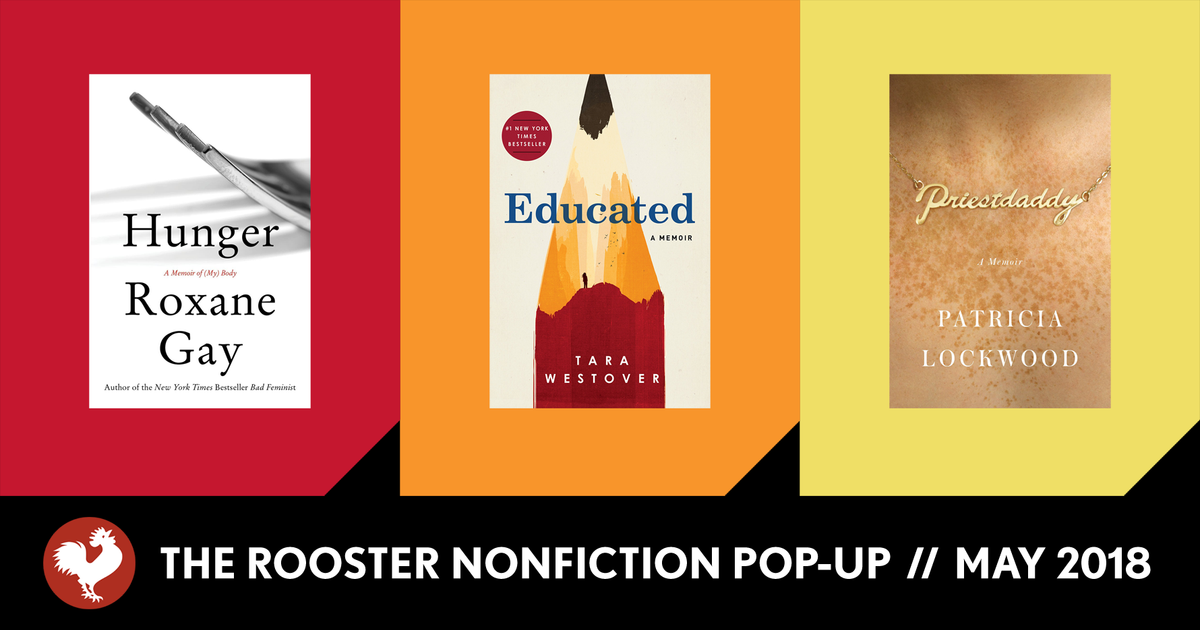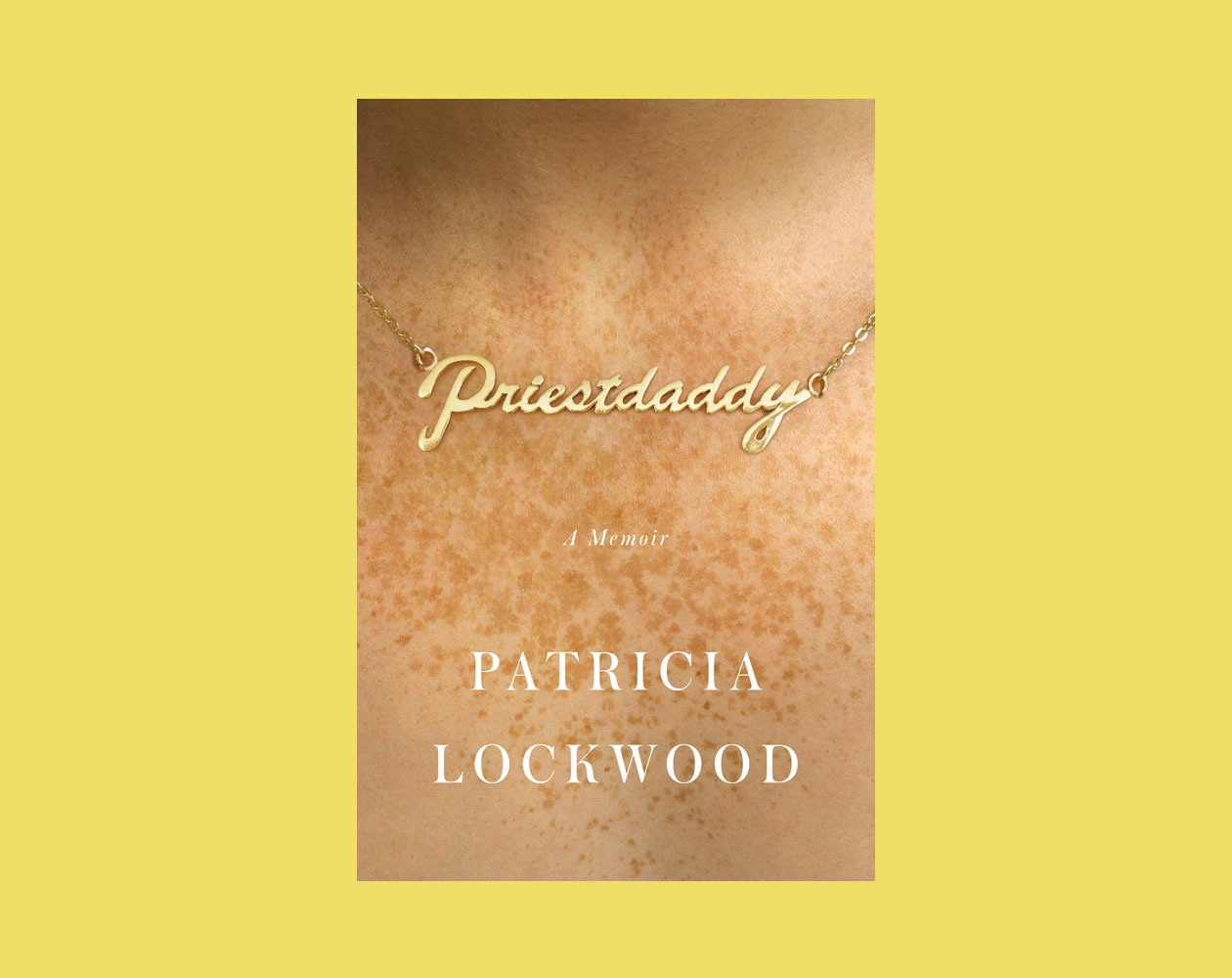The Rooster Nonfiction Pop-up: Priestdaddy, Second Half
Today we wrap up our third and final book in this month's reading, as Sarah Hepola and Andrew Womack discuss the culmination of Patricia Lockwood's memoir, which ends up being about so much more than her father.

Welcome to our first-ever Rooster Nonfiction Pop-up, brought to you by the organizers of the Tournament of Books.
All month long we’ll be discussing three recent works of nonfiction. To choose which books we’re reading this month, we asked this year’s ToB readers for suggestions back in March. We narrowed that list down to a single genre—memoir—and our readers voted to decide which three books we’d read for this event, and here they are: Hunger by Roxane Gay, Educated by Tara Westover, and Priestdaddy by Patricia Lockwood. You can see the full list of nonfiction contenders here.
Unlike the Tournament of Books and the Rooster Summer Reading Challenge, the Rooster Nonfiction Pop-up isn’t a competition—only a discussion about these three memoirs. Every Tuesday and Friday in May we’ll meet up to talk, and we’ll be teaming up with Sarah Hepola, author of the New York Times bestselling memoir Blackout: Remembering the Things I Drank to Forget. Grab some books and join in the fun!
- Catch up on previous chats: Hunger (first half, second half); Educated (first half, second half); Priestdaddy (first half)
- Jump into today’s discussion in the comments
Please note: We receive a cut from purchases made through the book links in this article.
Sarah Hepola is the author of the bestselling memoir, Blackout: Remembering the Things I Drank to Forget. Her writing has appeared in the New York Times, The Guardian, Elle, Glamour, BuzzFeed, Jezebel, and Salon, where she was an editor. She has been a contributor to The Morning News for more than a decade. She lives in Dallas, and she is currently working on a second book. Please don’t ask her about it.
Andrew Womack is a founding editor of The Morning News.
Andrew Womack: As I began the second half of Priestdaddy, I felt like a lot of the momentum Lockwood had been building in the first half just fell apart. Like, now it’s getting very scattershot and we’re exploring these smaller incidents in her life, but it wasn’t adding up. And then we get to the part about the sickness in their community and the nuclear waste, and all the various stories and characters suddenly clicked into place. The joke in the first half about her mother reading Prevention? About her seemingly irrational fears for her family’s health? Now we know why, and it’s so devastating how it all comes together.
Sarah Hepola: Again, we had a very different experience of this book. The second half was when I felt like the material got deeper in a good way. She starts to engage with the dilemmas I had expected earlier on: The betrayals of the church, the purpose of faith, the complications of the pro-life movement, the darker currents underlying her relationship with her father. It’s little less funny, a little more messy.
Her chapter on abortion was intense. And that chapter was a real risk, because she knows her readership is mostly pro-choicers, which is where she ultimately stands, but she paints the women on the other side of the debate in such a compassionate light. It was such a beautiful reparative to the dehumanizing way both sides talk about each other. And I found some of the language at the end of that chapter breathtaking:
A woman’s body always stands on the outskirts of the town, verging on uncivilization. A thin paper gown is all that separates it from wilderness. Half of its whole being is devoted to remembering how to live in the woods.
The story you’re referring to, though, is actually the next chapter, “Missouri Gothic,” which skillfully weaves the experience of an evangelical youth group with reports about radiation poisoning and a suspicious rash of medical ailments experienced by residents, including her own infertility, which is only glancingly mentioned but still a very intense reveal. That story also has this fascinating parallel between a more ancient fear of demonic possession, and a more pressing contemporary fear of: What’s in the water? What is our government doing to us? In a lot of these later stories, there’s this question rattling around that’s basically: What are we up against as humans, and what belief system gives us the best tools to confront those challenges? Faith? Science? Technology? Art?
Andrew: I’d agree about the second half. I loved the first half, but it was the second half where, for me, all the narratives came together in a very profound way. I feel like it’s so much of the preconceptions anyone has when they first approach any book: Oh, this is a book about __________, and with so many memoirs, that is the case. This is my memoir about how I did this thing and the truths I discovered about myself along the way. Or, this is my memoir about my hilarious family and their hijinks throughout my life. However, Priestdaddy is a memoir that covers so many highs and lows, comedies and tragedies, and the second half felt like the sum of the stories became so much greater than their parts, and that’s what stood out for me about this book.
Sarah: Hilarious hijinks can be a great way to bring in the reader, but a better book delves beneath the surface, and this one eventually did. Some readers won’t like that. They want to stay in the hijinks, but I’m always trying to hit bone. That’s what I crave from other people’s stories, in my own life as much as in literature. Give me everything. I’m a very emotionally demanding reader, and I suspect my exes would confirm I’m a pretty emotionally demanding partner, too. I just want to be in it with this person. And the second half of Priestdaddy was like: OK, finally! We’re going there.
I do think good memoirs are about more than their thumbnail description. Oh, this is a book about overeating and the trauma of sexual abuse, but really it’s about the deep, conflicted relationship we all have to our bodies and desires. Or, this is a book about a girl in a survivalist Mormon family, but really it’s about escaping the place you came from and the ache of never being able to return. I like the way memoirs buck our reductive tendencies, the way real people do, where we make these snap judgments, but the more people open up, it’s like: Whoa, there is so much more going on here than I thought.
Andrew: As we discussed last time, Lockwood is a poet and is writing some beautiful prose here. In the second half, I thought the chapter about singing was just stunning in how much it accomplished. If there’s a high point of how simply great the writing in this book is—and there are many—that chapter would be the pinnacle for me.
Sarah: Agreed, “Voice” is the high point of the book. If someone asked me what Patricia Lockwood could do as a writer, that’s the story I would give them. Its structure is reminiscent of “Rape Joke” in the way that the seriousness sneaks up on you. The chapter begins so off-handed, but it turns out to be the story of a teenage suicide attempt. It’s unusual to get these perfect little gems plunked down inside of a larger work, which speaks to one of the strengths and weaknesses of this book. It’s a little scattered and disconnected. But this is such a moving piece, and the scattered and disconnected quality feels exactly right for the material.

“In Priestdaddy, Lockwood interweaves emblematic moments from her childhood and adolescence—from an ill-fated family hunting trip and an abortion clinic sit-in where her father was arrested to her involvement in a cultlike Catholic youth group—with scenes that chronicle the eight-month adventure she and her husband had in her parents’ household after a decade of living on their own… Priestdaddy is an entertaining, unforgettable portrait of a deeply odd religious upbringing, and how one balances a hard-won identity with the weight of family and tradition.” (Amazon / IndieBound / Powell’s)
Book description excerpted from publisher’s summary and edited for length.
Andrew: A particularly poetic line earlier in the book that I loved is: “The story of a family is always a story about complicity.” This is the chapter about the dinner with the bishop and the child molestation accusations. So many of the scenes here and phrasing paint such vivid images of the messiness of life, bouncing between comedy and tragedy, and never really resolving anything. Which I think is appropriate, especially given how much tragedy we get in the second half.
Sarah: Oh, I loved that line. In fact, let me continue quoting it: “[The story of a family is] about not being able to choose the secrets you’ve been let in on. The question, for someone who was raised in a closed circle and then leaves it, is what is the us, and what is the them, and how do you ever move from one to the other?” Wow, that is so powerful. It reminds me a lot of the last memoir we read, Educated. How do you negotiate us and them?
Overall, I liked Lockwood’s treatment of the Catholic church scandals. I thought she was serious and honest without pretending to have an authority she doesn’t have. Her personal interaction with that scandal is minor, but how much is she complicit? How much is her father complicit? These are tough questions. I think it’s enough to raise them and wrestle with them.
Andrew: I really loved her writing about writing memoir, in particular in the “Interior Castle” chapter, where she tells the story about her road trip with her father when he swerves the car while she’s trying to use the portable toilet:
“Ahahaha!” my father laughed, a wild laugh, the laugh of a man who has taken on himself the task of driving a bucket of pee and a church window across the country, and though my face had flushed deeper than the oval in Jesus’ cup, I knew we must have been thinking the same thing: wouldn’t that make a story for the people back home.
I stumbled back to my seat and buckled myself in. Who does a story belong to, the one I rode beside? Neither my father nor I could really claim it. It belonged to some church far off in the distance, which neither of us had ever seen.
Who owns a story? In this chapter, she interrogates this idea that’s so central, to me, to the nature of memoir. She prefaces that story with this line about the believability of the character of her father that she’s been writing about:
Thinking if I could write him how he really is, I would be the greatest genius on earth. If I could see it as clear as it really was, and show it to you how it really happened.
Sarah: I really related to that last line about her father. I could feel her sinking a bit under the weight of the zany anecdotes and the insane, did-he-really-say-that lines, as well as the fact that her father is probably still a mystery to her, maybe even to himself. There is usually some point in writing a story where I feel like words are failing me, or I am failing words, and I want to throw out the laptop and the buttery language and just beam someone into my brain to see the footage stored there, but since this device has not been invented (yet), I go back to the laptop and I get to keep my modest career of attempting to render an immersive world in nouns and verbs.
As for the question of who owns a story: That’s an interesting one. The way I’ve sorted it out is that I don’t tell other people’s secrets, or their stories, but I write about how they intersect with my own. That leaves quite a bit of moral gray area, though, in terms of who gets to tell what about whom.
Lockwood mentions that as a young girl, she hated it when she became an anecdote in her father’s sermons. She felt flattened and misappropriated. I can’t tell if Priestdaddy is a kind of revenge, or the inevitable legacy: She is her father’s daughter, using skills she learned from him to tell a different kind of homily on a different kind of stage. Both their work is an act of faith, and hope, and love. In the end, they both want to be saved.
Andrew: Well put. And that concludes our main discussion of Priestdaddy. But on Friday Sarah, Rosecrans, and I will be back talk about all three of this month’s books. See you then!

